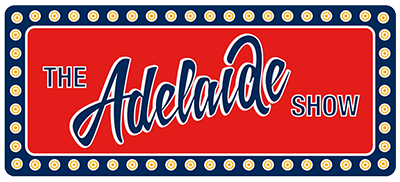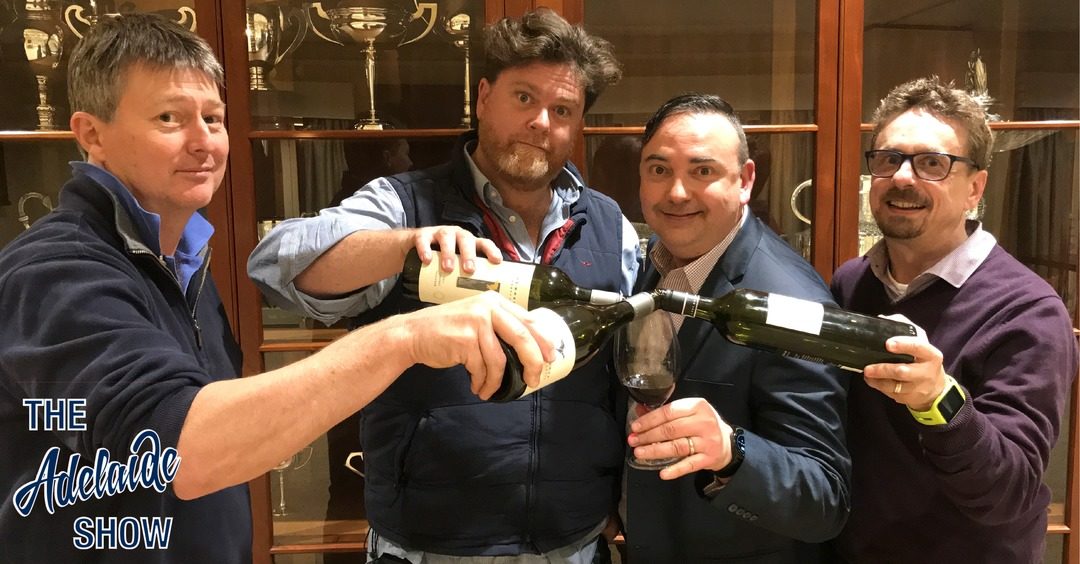South Australia is Australia’s home of wine so it is little wonder that the Royal Adelaide Wine Show bestows the most prestigious award each year, The Max Schubert Trophy, and it is also why we jumped at the chance to record this Royal Adelaide Wine Show Masterclass with winemaker, Greg Follett from Lake Breeze Wines, and wine writer and judge, Nick Ryan.
This week, the SA Drink Of The Week is the 2015 Lake Breeze Cabernet Sauvignon.
Michael will try to stump us in IS IT NEWS on the topic of wine.
In 100 Weeks Ago we hear from Craig Wilkins, chief executive of Conservation SA.
In stories without notice, we ask about the cask.
And in the musical pilgrimage … we hear from Zac Eichner.
Think you know #wine? Join our Royal #Adelaide #WineShow Masterclass with @NickRyanWine & Greg from @LakeBreezeWines https://t.co/8tv6j6n1pN
— The Adelaide Show (@TheAdelaideShow) September 20, 2017
And please consider becoming part of our podcast by joining our Inner Circle. It’s an email list. Join it and you might get an email on a Sunday or Monday seeking question ideas, guest ideas and requests for other bits of feedback about YOUR podcast, The Adelaide Show. Email us directly and we’ll add you to the list: [email protected]
If you enjoy the show, please leave us a 5-star review in iTunes or other podcast sites, or buy some great merch from our Red Bubble store – The Adelaide Show Shop. We’d greatly appreciate it.
Running Sheet: Royal Adelaide Wine Show Masterclass
| TIME | SEGMENT |
| 00:00:00 | Outtake |
| I was hoping for Lawsy | |
| 00:00:30 |
Theme |
| Theme and Introduction. Our original theme song in full is here, Adelaidey-hoo. | |
| 00:02:38 | SA Drink Of The Week |
| 2015 Lake Breeze Cabernet Sauvignon Langhorne Creek … tasting notes | |
| 00:22:52 | Stories Without Notice |
| Berri Estates has announced it is shrinking its workforce in the Riverland where they make cask wine. Should cask wine still be a thing? | |
| 00:32:52 | Greg Follett and Nick Ryan |
|
The Royal Adelaide Wine Show boasts the most prestigious award in the Australian industry, The Max Schubert Trophy. Max, of course, was the man who gave us Grange Hermitage but as we all know, a superb bottle of wine can taste different due to the weather, the food, your mood, and the friends you share it with. To explore why this is so and to help us find some objective pointers to help us have more confidence in our wine tasting abilities, we have Lake Breeze winemaker, Greg Follett, and renowned wine writer and judge, Nick Ryan. Greg, on your website, you biography says you’re still ‘winging it’ without knowing exactly what you’re doing. To what extent is there still mystery and luck in wine making? How divorced are some winemakers from the brutal realities of climate? For example, Pepperjack Shiraz is known for its consistency, year in, year out. What is going on there? Is consistency a dirty word among winemakers? Should we really be having a lottery when we open a bottle of wine, or should we know what we are getting – a bit like the politician question (should we be able to believe the hype)? How should we interpret wine labels? There are two giveaways that suggest bad wine to me. The first is there is much about the history of the dog or the windmill on the vineyard with little or no reference to the vintage or tasting notes? The second is the cellaring potential – the higher the number, the better the wine. How right or wrong is this? Nick, you have referenced how you can only muster a handful of shows as a judge each year, otherwise your teeth would fall out. What do you mean? How do you win the Max Schubert Trophy? If we are on a budget, are we REALLY locked out of good wine, or are there sneaky ways to sip past the marketing? What goes into the cost of a bottle of wine? I also want to raise the “S” word. In a Key Report earlier this year, on news Wine Australia was to spend $5.3million investigating the terroir of Shiraz in Australia, Philip White was quoted from his InDaily article, saying:
How can we navigate a wine list safely? Should we still support white wine? Decant or not decant? Can we go to the Royal Adelaide Wine Show? |
|
| 01:42:59 | Is It News? |
|
Michael Shanahan challenges the panel to pick the fake story from three stories from South Australia’s past. Port Augusta Dispatch, Friday 25 November 1904, page 4 South Australian Register, Saturday 29 June 1872, page 3 Register, Wednesday 30 December 1903, page 6 |
|
| 01:51:17 | 100 Weeks Ago |
|
In 100 Weeks Ago, we revisit our evening spent with Craig Wilkins, chief executive of Conservation SA, talking about all things transport and the environment in episode 113 of The Adelaide Show Podcast. At one point, though, we wrestled with the notion about how glued we are to our cars as opposed to public transport, and Craig shared this reflection from his time spent roughing it in Africa. (At the end of the snippet, we hear from our other guest in episode 113, Leigh Dalwood, associate director, transport planning within the Adelaide office of AECOM.) Before we hear it. Greg, you are someone who prefers the winery over being elsewhere. How much is it sweaty work among snakes and flies, and how much is it laboratory work and chemistry? |
|
| 01:57:32 | Musical Pilgrimage |
|
And our song this week is Breathe pt II’ by Zac Eichner, selected by our musical curator, Todd Fischer. Minimalism and attention to detail are terms that may sound slightly contradictory but this week’s featured artist, Zac Eichner, manages to combine them both. His soulful crooning has strong influences from Nick Murphy FKA Chet Faker and every element in his music is so crisp and carefully considered. On first impression the tracks seem simple but each time you listen to his EP you can find a new subtle melody that can become your favourite part of a song. His vocal layering creates some beautiful harmonies and one song on the EP, Selfless|Selfish, has well over a hundred vocal tracks which demonstrates how meticulous his creative process is. The reverbs and delays are all done through analogue gear which also adds to the depth and gives that extra personal touch. Zac’s lyricism has shades of Bon Iver – ambiguous yet somehow extremely relatable and emotive. He describes his debut EP, Home, as a story that flows both forwards and backwards on certain people he has met and the impact they had both directly and indirectly. Zac’s affable nature and commitment to his craft really impressed me and I look forward to watching him progress through his music career. His latest single Her Time, Her Mind came out last Saturday and you can check that out on all the usual platforms. He also has some huge gig announcements coming soon that I can’t reveal yet so keep an eye on his Facebook page for updates. As our theme on the podcast this week is Wine, I’ve decided to play Breathe pt II from the debut EP as it’s one of my favourites we all know it’s important to let let a good red breathe. |
|
| 02:08:30 | Outtake |
| I followed Bob Francis in 5AA’s old TAB building … You ignore me … You can clap, Greg | |
Here is this week’s preview video:
SFX: Throughout the podcast we use free sfx from freesfx.co.uk for the harp, the visa stamp, the silent movie music, the stylus, the radio signal sfx, the wine pouring and cork pulling sfx, and the swooshes around Siri.

